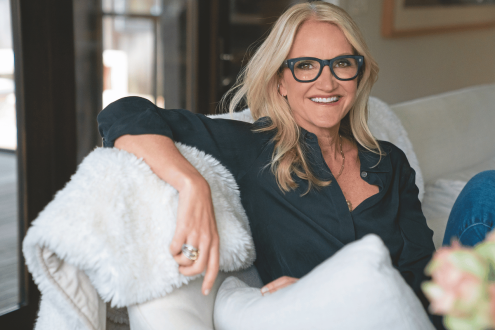The joy of being average
Most of us will never be exceptional at anything, or even reach the giddy heights of top of our game – and what’s wrong with that? Run-of-the-mill Lizzie Enfield extols the pleasures of an ordinary life, self-esteem intact

My 13-year-old son got his school report recently. It was OK, but it could have been better. He didn’t seem to care. ‘I’m at the average level expected of my year,’ he said – and I had to stop myself from telling him that he should aim to be above average. But should he? And why? We can’t all be better than average – there simply isn’t room at the top for everyone.
‘You’re special’
The exchange made me think of WH Auden’s poem The Average – about a young man whose parents sacrificed everything in their desire to turn their son into something incredible. But, when he saw himself as ‘the shadow of an Average Man Attempting the Exceptional’, he could only run away.
We have it drummed into us from an early age that we are exceptional, or that we have the potential to be. This is an appealing aspect of an egalitarian society – a meritocracy in which we can all become someone or something, if we only apply ourselves. It’s a nice idea, reach for the stars, they’re there for the taking, but the other side of it is: if we become anything other than ordinary, we feel that we’ve failed somehow.
‘There’s a painful divergence between our hopes for ourselves and the reality of our lives,’ philosopher, Alain de Botton, tells the audience at a TED talk on success. ‘You cannot be successful at everything. So, any vision of success has to admit what it’s losing out to. A lot of the time, our ideas about what it means to live successfully are not our own, they are formed by our parents and society.’ De Botton, author of Status Anxiety (Penguin, £10.99), went on to make the point that we need to move beyond the expectations of others and engineer our own ambitions, in order to find true pleasure in all our achievements – however great or small they are.
Need to make a difference
This struck a chord with me. I was telling a friend the other day that I felt that I was a second-rate writer. My reasoning? I am not an intrepid war correspondent in Syria, nor a Booker prize-winning novelist.
‘What exactly is wrong with being a second-rate writer?’ my friend asked. ‘Or even a tenth-rate one, for that matter? It’s better than a fiftieth-rate writer, isn’t it?’
Her words gave me something to think about. Why can’t I be happy with what I have achieved, instead of fretting about what I have not – and feeling madly driven to do better?
I am not alone in my goal-orientated thinking, and some psychologists believe the tendency to aim ever higher has its roots in a fear of mortality. In a largely secular world, we feel the need to make our mark. The irony is, when it comes down to it, do we really want to be remembered as a high achiever who launched a company which made it to the top of the FTSE 100 index? Don’t we actually want to be recalled as a kind, caring individual who was well thought of by friends and family?
I know I’d rather my epitaph was personal and not professional – and yet my professional life and chasing after elusive parts of it seem to matter more than they should.
It’s never enough
‘For different reasons, many people in the Western world have low self-esteem,’ says psychologist, Honor Jane Newman, author of Killing The Perfectionist Within (Balboa Press, £12.99). ‘In Western culture, high achievers and perfectionists generally have a “core belief” – a deep-seated conviction – that nothing they ever do is good enough,’ says Newman. ‘Therefore, they are constantly striving to disprove this with more and more achievement. In this sense, they are not able to appreciate their own achievements as much as they might.’
Newman believes this attitude stems, in part, from the way we parent, and were parented: either being on the receiving end of, or giving, extreme criticism; or being too doting or doted upon – creating young adults who can only be toppled from the pedestal of childhood and end up with low self-esteem as a result.
So, it’s important to teach children the value of the ordinary things in life, and tread a fine line between praising genuine achievements and creating unrealistic expectations which, when they don’t realise them, will make our children feel like failures.
‘I’ll make you a star’
The media is as much to blame for these improbable beliefs, says de Botton, perpetuating the ‘everything is possible myth’ and taking little notice of concepts such as luck and misfortune. ‘It’s as unlikely nowadays that you will become as rich and famous as Bill Gates as it was unlikely in the 17th century that you would exceed to the ranks of the French aristocracy, but it does not feel that way. We are made to believe that, if you’ve got energy and a few bright ideas, anything is possible.’
This may very well be the media’s attitude (and perhaps the reason that we have so many TV talent shows promising stardom and riches) and yet our language is full of references that underline our acceptance of, and even respect for, averageness: ‘Salt of the earth; boy or girl next door; the man in the street’ are phrases we use regularly to summon up a sense of admiration of ordinariness. And, despite the fact they often appear to feel undervalued by their employers, we tend to value ordinary citizens – nurses, teachers, firefighters and road workers; those people who want to build communities, rather more than the ones constructing shrines to their own egos.
Researchers have even revealed scientific evidence to indicate that average-looking, less-distinctive people are more attractive to others than the exceptional beauties of the world.*
‘Every person has something good to offer,’ says Newman. ‘But many of us need to cultivate a more realistic self-image, one in which we recognise that it’s all right to have strengths and weaknesses in our make-up.’
So, here’s to the joy of being average, unexceptional, middle of the road, whatever you want to call it. It’s time to embrace averageness and enjoy our ordinary lives.
Watch Alain de Botton’s TED Talk, ‘A Kinder, Gentler Philosophy Of Success‘
Embrace your ordinary
Ponder and complete these sentences in your journal I love to stand out because…
- I hate to stand out because…
- I want to be extraordinary because…
- I want to be ordinary because…
- Average means…
- If I believed I was good enough, I would…
- True success is…
- Real achievement is…
- I’ll be happy when…
- In the past, I got approval by…
- I love my friends best when…
- I approve of, and like myself, best when…
- Whose approval do I seek most, and why?
* The Guardian, 2015.
Photograph: iStock









